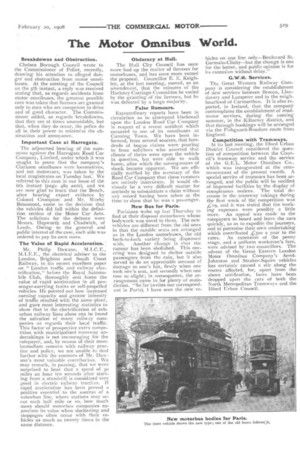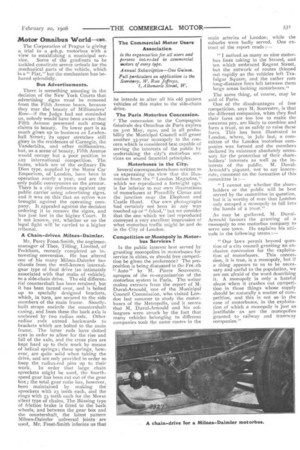The Motor Omnibus World.
Page 9

Page 11

Page 12

If you've noticed an error in this article please click here to report it so we can fix it.
Breakdowns and Obstruction.
Chelsea Borough Council wrote to the Commissioner of Police, recently, drawing his attention to alleged danger and obstruction from motor omnibuses. At the meeting of the Council on the sth instant, a reply was received stating that, as regards accidents from motor omnibuses, the greatest possible care was taken that licenses are granted only to men who are competent to drive and of good character. The Commissioner added, as regards breakdowns, that they are at times unavoidable, but that, when they do occur, the police do all in their power to minimise the obstruction and annoyance.
Important Case at Harrogate.
The adjourned hearing of the summons against the Harrogate Road Car Company, Limited, under which it was sought to prove that the company's Clarkson omnibuses were locomotives, and not motorcars, was taken by the local magistrates on Tuesday last. We referred to this case in our issue of the 6th instant (page 489 ante), and we are now glad to learn that the Bench, after hearing expert evidence by Colonel Crompton and Mr. Worby Beaumont, came to the decision that the vehicles did fall within the definition section of the Motor Car Acts. The solicitors for the defence were Messrs. Hepworth and Chadwick, of Leeds. Owing to the general and public interest of the case, each side was ordered to pay its own costs.
The Value of Rapid Acceleration.
Mr. Philip Dawson, M.I.C. E., M. I . E. E., the electrical adviser to the London, Brighton and South Coast Railway, in his recent excellent paper on " London traffic and railway electrification," before the Royal Automobile Club, thoroughly sent home the value of rapid acceleration in all passenger-carrying trains or self-propelled vehicles. He pointed out how increased earning capacity and greater intensity of traffic resulted with the same plant, and gave most interesting statistics to show that in the electrification of suburban railway lines alone can be found the salvation of many railway companies as regards their local traffic. This factor of prospective extra competition with municipalised tramway undertakings is not encouraging for the ratepayer, and, by reason of their more immediate concern with railway practice and policy, we are unable to deal further with the contents of Mr. Dowson's most valuable contribution. We . may remark, in passing, that we were surprised to hear that a speed of 30 miles an hour ten seconds after starting from a standstill is considered very good in electric railway tractian. If rapid acceleration has been proved a positive essential to the success of a suburban line, where stations may occur each half mile or so, how much more should motorbus companies appreciate its value when slackening and stoppages often occur with their vehicles as much as twenty times in the same distance. Obduracy at Hull.
The Hull City Council has once more had ,up the matter of licenses for motorbuses, and has once more vetoed the proposal. Councillor F. E. Keighley, at the last meeting, moved, as an amendment, that the minutes of the Hackney Carriage Committee be varied by the granting of the licenses, but he was defeated by a large majority.
False Rumours.
Extraordinary reports have been in circulation as to attempted blackmail upon the London Road Car Company in respect of a recent accident which occurred to one of its omnibuses at Canning Town. We have been informed, from several sources, that hundreds of bogus claims were pouring in from solicitors who asserted that clients of theirs were upon the vehicle in question, but were able to walk home, after which the consequences of shock became apparent. We are officially notified by the secretary of the Road Car Company that these rumours are entirely inaccurate. It would obviously be a very difficult matter for anybody to substantiate a claim without any record having been taken at the time to show that he was a passenger.
New Bus for Paris.
Parisians woke up last Thursday to find at their disposal motorbuses whose bodywork was novel to them. The new vehicles are different from the old ones in that the outside seats are arranged as in the London motorbuses, the old back-to-back variety being dispensed with. Another change is that the canopy has been abolished. This covering was designed to shelter outside passengers from the rain, but it also served to do an appreciable amount of damage to one's hat, firstly when one took one's seat, and secondly when one rose to alight; in consequence, the arrangement came in for plenty of malediction. "So far (writes our correspondent in Park), I have seen the new ve hides on one line only—Boulevard St. Gerrnain-Clichy—but the change is one for the better, .and public opinion is for its extension without delay.''
G.W.R. Services. •
The Great Western Railway Com pany is considering the establishment of new services between Brecon, Llandovery and Larnpeter and in the neighbourhood of Carmarthen. It is also reported, in Ireland, that the company contemplates the establishment of roadmotor services, during the coming summer, in the Killarney district, and that through bookings will be arranged via the Fishguard-Rosslare route from England.
Competition with Tramways. At its last meeting, the Ilford Urban District Council considered the question of competition between the Council's tramway service and the service of the G.E.L. Motor Omnibus Co., which was inaugurated at the commencement of the present month. A special service of tramcars has been arranged, and the public will be notified of improved facilities by the display of conspicuous notices. The total decrease in the tramway takings during the first week of the -competition was .Z;t9, and it was stated that the working expenses were possibly a little more. An appeal was made to the ratepayers to board and leave the cars quickly, so as to expedite the journeys, and to patronise their own undertaking which contributed ,4;300 a year to the rates. An extension of the penny stage, and a uniform workman's fare, were advised by two councillors. The advent of the Great Eastern London Motor Omnibus Company's Arm!Johnston and Straker-Squire vehicles has certainly caused a stir along the routes affected, for, apart from the above notification, fares have been dropped upon the cars of both the
North Metropolitan Tramways and the Ilford Urban Council. The Corporation of Prague is giving a trial to a 4oh,p. motorbus with a view to establishing a municipal ser vice. Some of the gradients to be tackled constitute severe ordeals for the mechanical parts of the vehicle, which is a" Fiat," but the mechanism has behaved splendidly.
Bus Advertisements.
There is something amusing in the decision of the New York Courts that advertising signs must be removed from the Fifth Avenue buses, because they mar the beauty of Millionaires' Row—if the Judge had not reminded us, nobody would have been aware that Fifth Avenue possessed such strong claims to beauty. Its lower part is as much given up to business as Leadenhall Street; its upper stretches still glory in the residences of Carnegie, the Vanderbilts, and other millionaires, but, as a scene of beauty, Fifth Avenue would occupy but a poor position in any international competition. The buses, which are of the ordinary De Dion type, supplied by the Motor Car Emporium, of London, have been in operation nearly a year, and are the only public conveyances on the avenue. There is a city ordinance against any public carrier using advertising signs, and it was on this that an action was brought against the operating company. It appealed against the decision ordering it to remove the signs, and has just lost in the higher Court. It It not known, yet, whether or no the legal fight will be carried to a higher tribunal,
A Chain-driven Milnes-Daimler.
Mr, Percy Frost-Smith, the engineermanager of Thos. Tilling, Limited, of Peckham, recently completed an interesting conversion. He has altered one of his many Milnes-Daimler bus chassis from the well-known internalgear type of final drive (so intimately associated with that make of vehicle), to a side-chain drive. The old differential countershaft has been retained, but it has been turned over, and is bolted up to specially designed brackets, which, in turn, are secured to the side members of the main frame. Stoutlybuilt straps encircle the countershaft casing, and from these the back axle is anchored by two radius rods. Other radius rods extend backwards to brackets which are bolted to the main frame. The latter rods have slotted eyes in order to allow for the rise and fall of the axle, and the cross pins are kept hard up to their work by means of helical springs ; these springs, however, are quite solid when taking the drive, and are only provided in order to keep the radius-rod pins up to their work. In order that large chain sprockets might be used, the fourthspeed gear has been cut out of the gear box ; the total gear ratio has, however, been maintained by making the sprockets with 23 teeth each, and the rings with 53 teeth each for the Morse silent type of chains, The Bussing type of friction brake is fitted to the back wheels, and between the gear box and the countershaft, the latest pattern Milnes-Daimler universal joints are used. Mr. Frost-Smith informs us that
he intends to alter all his old pattern vehicles of this make to the side-chain drive.
The Paris Motorbus Concession.
f' The concession to the Cornpagnie Generale des Omnibus de Paris expires On 31st May, 1910, and in all probability the Municipal Council will grant another 35-year monopoly to the concern which is considered best capable of serving the interests of the public by undertaking the city's motorbus services on sound financial principles.
Motorbuses in the City.
Several correspondents have written to us expressing the view that the illustration from the " London Magazine," which we reproduced a fortnight ago, is far inferior to our own illustrations of motorbuses at Piccadilly Circus and the junction near the Elephant and Castle Hotel. Our own photographs had certainly not been in any way touched up or" faked," but we consider that the one which we last reproduced conveyed a very excellent: impression of what motorbus traiIic might be and do in the City of London.
Competition or Monopoly in Motorbus Services Is the public interest best served by granting monopolies in motorbuses for service in cities, or should free competition be given the preference? The proposition is being discussed in the French " Auto " by M. Pierre Souvestre, apropos of the re-organisation of the motorbus system in Paris. The writer makes extracts from the 'report of M. Duval-Arnould, one of the Municipal Council Commission,who visited London last summer to study the motorbuses of the Metropolis, and it seems that M. Duval-Arnould and his colleagues were struck by the fact that many vehicles belonging to different companies took the same routes in the
main arteries of London, while the suburbs were badly served. One extract of the report reads :—
" I noticed as many as nine motorbus lines taking in the Strand, and ten which embraced Regent Street, but the network of routes thinned out rapidly as the vehicles left Trafalgar Square, and the rather rare long-distance lines left between them large areas lacking motorbuses."
The same thing, of course, may be said of Paris.
One of the disadvantages of free competition, says M. Souvestre, is that the different companies, when they find their fares are too low to make the concerns pay, are likely to combine and form a trust, so as safely to raise those fares. This has been illustrated in London, where, in July last, a committee of the London motorbus companies was formed and the members declared its existence absolutely necessary for the protection of their shareholders' interests as well as the interests of the public. M. DuvalArnould's piquant, not to say inaccurate, comment on the formation of this committee is :—
" I cannot say whether the shareholders or the public will be best served by the committee in question, but it is worthy of note that London only escaped a monopoly to fall into the hands of a trust."
As may be gathered, M. DuvalArnould favours the granting of a monopoly to one motorbus company to serve one town. He explains his attitude in the following terms :— " Our •laws permit beyond question of a city council granting an exclusive concession for the exploitation of motorbuses. This • concession, it is true, is a monopoly, but if a thing appears to us to be necessary and useful to the population, we are not Afraid of the word describing it. A monopoly is only a hateful abuse when it crushes out competition in those things whose supply should be naturally a matter of 'competition, and, this is not so in the case of motorbuses, in the exploitation of which a monopoly is just as justifiable as are the monopolies granted to railway and tramway companies."
A Halley Wagonette.
The wagonette which we illustrate on this page is a Halley vehicle which is in public service in Scotland. As we stated a fortnight ago, it has covered 4,000 miles, and has not been off the road a single hour through mechanical defects. Mr. John Gibson, of Wishaw, is the owner of this vehicle.
Breakdown Work.
The L.C.C. continues to use its ArrolJohnston and Foden vehicles for clearing the tracks when horse-drawn vehicles break down, and not infrequently for conveying emergency tackle when a tramcar goes off the lines, as is depicted in the accompanying illustration. The carrying and towing power of even these 12-r5h.p. Arrol-Johnston vehicles has proved to be of the greatest service to the tramway undertaking.
A New " Union Jack" Service.
On Monday, the s7th instant, the London Road Car Co., Ltd., inaugurated a new service of motorbuses between Hanunerstnith and Brixton, via Shepherd's Bush, Notting Hill Gate, Marble Arch, Oxford Circus, Piccadilly Circus, Charing Cross, Westmizo ster Bridge, and Kennington Road. The service is maintained by 20 Straker-Squire vehicles, the majority of them having been transferred from the Hammersmith and Shoreditch service. The destination boards of th:s service have a turquoise-coloured background with " Hammersmith and Brixton " painted on in white, lined out with black, whilst the sign-boards have a similarly-coloured background with " Union Jack " in gold, outlined in velloW. This service has been allotted the letter " K."
Lamp-post Renew als.
At a recent meeting of Westminster City Council the Highways Committee reported that it had been in communication with the London Road Car Co., Ltd., with a view to entering into a reciprocal arrangement as to the settlement of all claims. The Council had agreed previously to accept half the amount of its claims in cases of damige caused by the Road Car Company's vehicles. With regard to the new proposal, however, the company expressed the opinion that, except as regards claims far damage to certain specified property of the Council, claims made by the companyor by the Council should be dealt with on their merits. The Highways Committee on further consideration made no objection to this, and has specified the property to which the working arrangement with the company is to apply as follows :—Street lamps and other fixtures in the streets such as ballast bins, guard posts, water posts and hydrants, street pavements, all buildings the property of the Council.
The "Grosse Berliner."
On•ce again the directors of Berlin's great electric tramcar company, the " Grosse Berliner Strassenbahn-Gesellschaft," are in a position to announce a dividend of 8 per cent. ; the net profits amounted to close upon so million marks, or a round half million pounds sterling. As our readers are aware, this gigantic concern, which employs 70,391 persons and, during the past twelvemonth, carried no fewer than 378 million passengers, is the parent of the " Grosse Thrliner Motoromnibus-Gesellschaft," which was founded with the object of working city and suburban routes not directly connected up with a permanent way, by motorbuses—in short, lines designed to supplement the tratncar system with its network of rails, roughly 326 miles in length. Upon this branch company, the directors have little to say in their report, yet that little leaves one in no doubt whatever as to the state of affairs. All they have to observe on the undertaking is that the company has as yet too small a number of lines working to warrant any statement in regard to the profitableness of the concern at present. In other words, the three or four lines now worked yield no profit. As a matter of fact, there is, we believe, only one Berlin motorbus line which shows a profit, or, at any rate, does not work at a loss, and this falls within the system of the Berlin General Omnibus Company. It is the line connecting the Stettiner Bahnhof with the Hallesches Tor, and it passes through the Friedrichstrasse, which might be compared to London's busy Bank-Charing Cross route. Under these circumstances, the tramcar company's managers are not manifesting any keen desire to multiply their motorbus lines. Instead of embarking on ventures, they prefer to keep back in the garages much of the rolling stock acquired for a far more ambitious scheme than three or fout lines, and let out vehicles for a _consideration or use .them for excursion trips round the capital. *




























